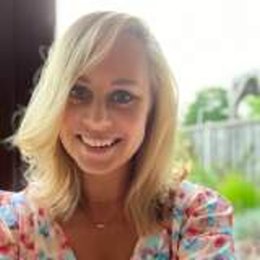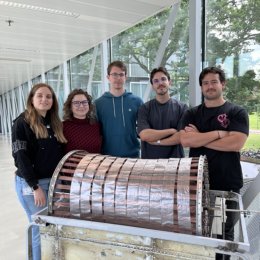In the summer of 2023 Odyl ter Beek, Assistant Professor of the Department of Advanced Organ Bioengineering and Therapeutics (AOT), received a special invitation from the makers of the television program "Jekels Jacht". They wanted to dedicate an episode to Willem Kolff, the pioneer behind kidney dialysis.
Enthusiasm and preparations
The AOT students were immediately excited because the topic of the episode fit seamlessly with their ongoing projects and also offered a fun experience to collaborate on a TV show. Despite the challenging timing due to the summer vacation and graduation period, the AOT team began the preparations full of energy. They immersed themselves in Kolff's thesis, which included detailed drawings, measurements and experiments of his first dialysis machine. They also visited the Rijksmuseum Boerhaave in Leiden, where one of Kolff's first dialysis devices is on display. Dialysis technology has hardly changed in all these years, but today's devices look very different from Kolff's first device.
Approach and execution
The students were given a lot of freedom in their approach and planning. They studied the drawings and measurements themselves, searched for materials in thrift stores and on the Internet, and maintained contact with departments such as TCO and DesignLab. The project was divided into two main parts: (1) the frame with the container for the dialysis fluid and (2) the drum with the membrane through which the patient's “blood” was to flow. Regular work meetings helped evaluate progress and make adjustments as needed. Building the device required several new skills. The students, many of whom had biomedical and chemical backgrounds, had little experience with engineering drawings, wood and metalworking, mechanics and electronics. They had to learn how to rotate the drum with wheels, gears and bearings and how to connect an old motor of the era to the modern electrical grid. Odyl ter Beek: “It was wonderful to see how the students within the group learned to cooperate and consult effectively with each other and other teams. The realisation that the two parts must eventually become one became clear. I am incredibly proud of the students and the end result they achieved together!”
Collaboration and creative solutions
Cooperation within the group went well, although it was challenging at times because the students picked up this Kolff project alongside their projects and experiments. They had to learn to plan, consult and use each other's skills, even though many of them had no background in mechanics or electronics. Finding and modifying parts and making an old engine work were all new to them. Odyl ter Beek: “It was nice to see how, despite stressful moments, they remained flexible and understanding.”
One of the biggest challenges was using materials from Kolff's time, such as aircraft metal, sewing machine engines and water pumps from old Ford cars. These parts were hard to find and required a lot of flexibility. These parts were hard to find and required creative solutions. For example, the students used old bicycle wheels for the drum, which required modifying the frame with the dialysis sink. When they had trouble finding the right rotational speed for the drum, they had to experiment with different motors. Because of the time constraints of the TV program, the group chose to build the device “in the spirit of Kolff” rather than making a replica.
Historical research and final results
Historical research played a crucial role because Kolff's invention had to be recreated as accurately as possible with authentic parts. Kolff's thesis provided detailed instructions, and Herman Broers, Kolff's biographer, was involved in the shooting. His knowledge and stories gave the team deep insight into Kolff's work and the context in which he operated.
The students learned a lot about Kolff and his invention, as well as about building devices with all the practical skills involved, not to mention the help of TCO! In addition, they developed important soft skills such as cooperation, planning and communication. They were proud of the result:
Educational value
This project demonstrated the tremendous value of replicating historical scientific experiments. It gave students insight into the necessity and circumstances of scientific inventions, as Odyl ter Beek emphasised, “I think this is important for education today. It offers students insight into why science is so important! Historic scientific experiments underlie the work we get to do today; that's special and important to realise!”
Reproducing Willem Kolff's artificial kidney for Jekels Jacht was a challenging but highly educational project. It taught the students not only new technical skills but also a deep understanding of the history and value of scientific research. This adventure enriched and inspired the team to continue working on the medical technologies of the future with the same pioneering spirit.







